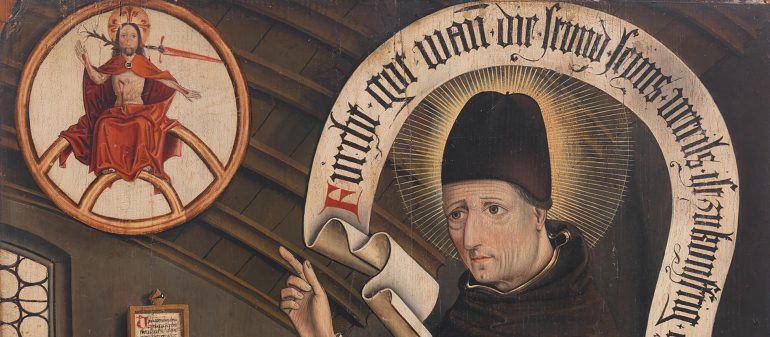Series: Great Theologians in Church History – Part 11
Albert was a theologian and bishop, settling disputes and one of the most important theologians of the Middle Ages. His great contribution was to present theology as a science—a legacy from which the Church still benefits today.
by Benedict Bogle , bon – 15.11.2021
Albertus Magnus was born around 1200 in Luingen an der Donau. From 1222 Albert studied liberal arts in Padua, shortly thereafter he joined the Dominican Order. At that time the order was only half a century old. Founded in 1170 by the Dominicans, the religious must devote itself exclusively to Christian preaching and thus declare the faith. Albert taught in various branches of the Dominican order as early as 1234. Many religious houses had their own education to train the brothers. From 1243 to 1245 Albert received a master’s degree in theology in Paris and taught in the French city for some years. From 1248 Albert founded a “Studium Generale” in Cologne, where, among other things, he became a teacher of the studying theologian Thomas Aquinas. In 1254 Albert was elected a German provincial of his order, from 1260 he was bishop of Regensburg for two years. After his resignation he taught again, returned to Cologne and died there in 1280.
Albert as a Peacemaker
Albertus Magnus combines two geniuses: on the one hand, Albert is one of the most important theologians of the Middle Ages. The religious, on the other hand, also knew how to act politically efficiently – and in many cases became peacemakers. He was able to prove this in Paris. There was a conflict between the city and the University of Paris in the so-called “Monk Order dispute”. Universities at that time were corporations with their own jurisdiction; This has repeatedly given rise to disputes with cities over capacity. In Paris, the city passed laws restricting the freedom of the university. The university reacted quickly: many masters and students left Paris, hurting the city mainly financially. The orders of the beggar broke this strike of the university. Albertus Magnus distinguished himself as a peacemaker who was able to mediate between harsh fronts. Later in Cologne he played a similar role in the dispute between the bishops and the citizens of the city.
bishop and scientist
The same applies to the time of the bishop in Regensburg. In 1260, Albert’s appointment as bishop was highly unusual and met resistance in his own right: it did not suit Dominicans as a mendicant order to assume such high church offices. Albert submitted to the will of the Pope and took over as a financially desolate and divided episcopal see. Within two years he was able to defuse the situation. Perhaps that is why he resigned as bishop after such a short time – because he had achieved his goal and could now hand the diocese into the hands of a new bishop. However, it is sometimes believed in science that Albert wanted to re-dedicate himself to science and therefore resigned.

In 1260 Albert was appointed bishop of Regensburg.
Even though there’s no evidence for it, the theory hits a real point: Albert’s real calling was science. Like any other, he shaped theology as a science. “Albertus has created a new model of science that makes theology as an independent science,” says Professor Marc Ailko Eris. He is Professor of Medieval Latin Philology at LMU Munich and director of the Albertus Magnus Institute in Bonn, which has been researching Albert’s thinking and work since the 1930s. “Only now can theology be defined as a science,” says Eris.
Aristotle becomes accessible to the West
For Albertus the preoccupation with the ancient philosopher Aristotle is decisive. And its reception gained momentum in the 13th century: a great deal of his writings for the Western world could not be read in the original. Although one knew of his works and knew roughly their contents through summaries, complete texts were not available. The Moorish-Christian border regions now encounter the writings of the philosopher, which survived in the Arab world. Only now, Professor Aris points out, is almost all of Aristotle’s work available to the Christian thinkers of the West. Albert begins to comment on his actions. “Albertus resolves to interpret the system of science as developed by Aristotle. He seeks to use all possibilities for scientific development.” Albertus succeeded in separating the various scientific disciplines from one another by dealing with the ancient philosopher: “It is the differences in theology, philosophy and natural science that become systematically dominant through Albertus Magnus,” explains Professor Aris. .
understanding and progress
Albert worked on commentaries on Aristotle, on Dionysius Areopagita, on the books of the Holy Scriptures. For Aristotle, understanding his writings is a great achievement. Albert was sometimes accused of having barely brought his own ideas into theology. Mark Ailko Eris paraphrased: “The quality mark for a medieval thinker is that he is able to process tradition. Aristotle is not so easy to understand. Albertus’s understanding is a great achievement.” Moreover, Albert always adds to Aristotle’s statements, thinks ahead, adds to them. A particularly large number of manuscripts have survived from these books – an indication that they have been read and obtained particularly frequently.
“Doctor Universalis”
Theology has been profiled through the work of Albert. “Now theology can be seen as a science in itself,” says Eris. “Without Albert, theology would lack a strong scientific dimension—as a science equivalent in contention between faculties.” In addition to philosophy and theology, Albert also dealt with the natural sciences. He observed and described his surroundings. Albert’s wide creative field earned him the title “Doctor Universalis” – “universal scholar”. In 1931 he was canonized and appointed doctor of the Church.

Web guru. Amateur thinker. Unapologetic problem solver. Zombie expert. Hipster-friendly travel geek. Social mediaholic.





